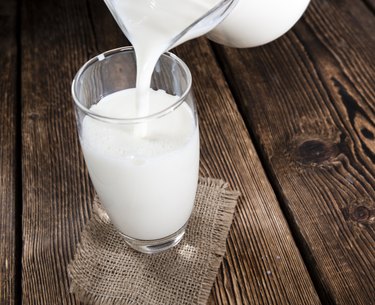
Calcium carbonate is most often found in dietary supplements. In fact, it's one of the most common forms of supplemental calcium taken today. But calcium carbonate is also used as a food additive in many commercial goods. It helps reduce the acidity of certain foods and can act as an anticaking agent in others. You can find it in items from cake mixes, canned soups and soymilk to fortified cereals, pre-cooked pastas and condiments, such as mustard or soy sauce. Even some wines, beers and distilled spirits are prepared with this form of calcium.
Milk Allergies
Video of the Day
The wide array of foods and beverages made with calcium carbonate shouldn't negatively affect those with milk allergies, because most milk allergies have nothing to do with calcium. Instead, a milk allergy involves an abnormal response to two of the proteins found in milk: casein and whey. Like other allergies, your immune system misidentifies these proteins as harmful substances, causing the release of antibodies to protect the body from harm. The antibodies also trigger the release of chemicals, which prompt the symptoms often associated with an allergic reaction.
Video of the Day
Symptoms
If you have a milk allergy, consuming any food or beverage made with either casein or whey typically causes a gastrointestinal response, such as nausea, vomiting, abdominal cramps, loose stools and diarrhea. A rash, hives, coughing, wheezing, trouble breathing, runny nose and watery eyes often accompany these symptoms.
Treatment
As with any allergy, the best form of treatment is to avoid products containing milk. Obviously, milk, butter, yogurt, ice cream and cheese are off the menu, but many other foods can contain dairy, so pay close attention to ingredients. Besides casein and whey, avoid foods made with prefixes starting with "lact," recommend the experts at MayoClinic.com. You may also have problems with artificial butter flavor, artificial cheese flavor and even protein powders. Talk to a doctor or dietitian to establish the best diet for you.
If you do eat something containing milk proteins, taking an antihistamine can help relieve some of the minor symptoms. With a serious reaction, this medication isn't enough, and you'll need an injection of epinephrine -- as well as a trip to the hospital.
Precautions
Although people with milk allergies don't usually have issues with foods made with calcium carbonate, this doesn't necessarily mean you can't experience an adverse reaction to this compound. When taken as a dietary supplement, people have reported gas, bloating and constipation. Some people may also be allergic to an ingredient in calcium carbonate, preventing them from taking this form of calcium supplement.